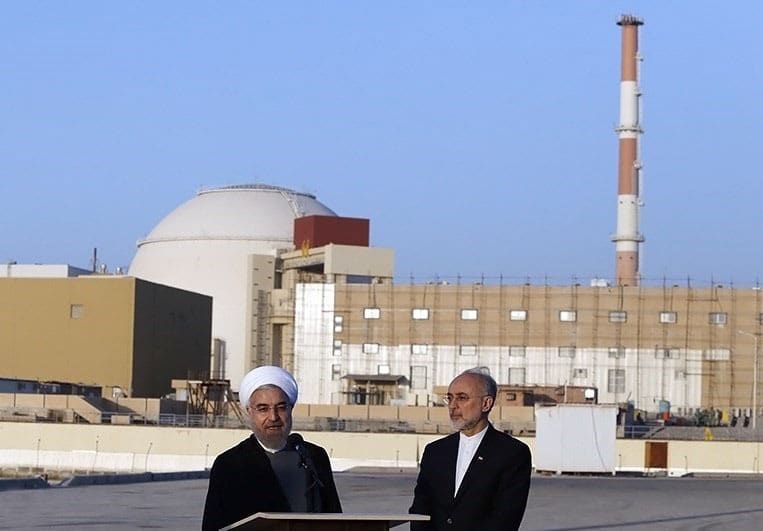Should nuclear power be expanded significantly into developing countries?
By Yulia Katsenko, Oksana Mironchuk, Evgenii A. Veretennikov, Kristin Ven Bruusgaard | June 20, 2019
 Iranian President Hassan Rouhani and Head of the Atomic Energy Organization of Iran (AEOI) Ali Akbar Salehi at the Bushehr Nuclear Plant in 2015.
Iranian President Hassan Rouhani and Head of the Atomic Energy Organization of Iran (AEOI) Ali Akbar Salehi at the Bushehr Nuclear Plant in 2015.
As demand for energy rises in the developing world, nuclear power could provide one partial solution to the global climate crisis. Large countries such as Russia and China are both investing in nuclear power and positioning themselves to export technology and expertise. But whether developing countries should incorporate nuclear energy depends on a range of factors such as local energy demand and the availability of other energy sources. They should also consider how competitive nuclear energy would be. Most important, countries that go nuclear should have sufficient technological, industrial, and political stability.
Developing nuclear power infrastructure in these countries will not be easy. First there are the perennial challenges—namely ensuring safety and security of nuclear power plants, preventing nuclear proliferation, and managing nuclear waste. The international community must control the fuel cycle, including the fuel supply and the export of spent fuel. Furthermore, significant nuclear power expansion—meaning that nuclear power provides at least 25 percent of electric power in a region—should be contingent on political stability, the mastery of modern technologies, the development of a tradition of quality-assurance engineering, and the availability of qualified human resources and state investments.
Nuclear expansion in the Middle East. The Middle East has huge and growing energy demands that are projected to increase by 81 to 114 percent by 2050. Several countries in the region have announced ambitious plans for nuclear energy development to help meet this growing demand. For instance, Iran has one nuclear power plant already in operation with several more on order from Russia. The UAE has the South Korean-supplied Barakah plant nearing operational status. Egypt has plans, albeit delayed, for a plant. Saudi Arabia is pursuing nuclear infrastructure with the help of the United States, and Jordan has signed a contract to build its first plant. Although some of the most ambitious plans in the region have been stymied by the Fukushima accident and by domestic opposition, several countries remain committed to nuclear power acquisition not only out of necessity, but also for a variety of political reasons. Political instability in the Middle East, however, raises serious concerns that an expansion of nuclear power increases the potential of nuclear proliferation and terrorism. Hence, a significant expansion should be done under a strict International Atomic Energy Agency (IAEA) inspection regime.
Nuclear expansion in Southeast Asia. Ten percent of the population of Southeast Asia remains without electricity. The IAEA projects the regional demand for energy in Southeast Asia will increase by two thirds as the region’s economy is expected to triple in size by 2040. Several countries in the region are well developed and have expressed interest in civilian nuclear power. Indonesia has significant experience and infrastructure in nuclear technology and has been considering nuclear energy to decrease dependence on hydrocarbons. It is planning to have its first nuclear power plant by 2030. Malaysia is also well placed for nuclear energy development and has been seriously considering the nuclear option since the late 2000s. Still, both public perceptions of nuclear power and high investment costs in these countries have affected developments. For example, Vietnam halted its nuclear expansion plans because it was not considered economically viable. Still, this region has good prerequisites for significant expansion with its relative political stability, large population concentrations, and few other evident sources of energy.
Nuclear expansion in Africa. Energy demand in sub-Saharan Africa is projected to grow by 80 per cent by 2040—that is, at 3.5 percent a year—faster than the global average of 1.3 percent. Ghana, Kenya, and Namibia have expressed interest in nuclear power. Russia is at various stages of negotiating nuclear cooperation agreements with at least 16 African countries. Currently, only South Africa has a functioning nuclear power plant. However, several African countries possess substantial uranium ore deposits. Namibia, for example, has seven percent of the world’s known uranium reserves and has made a political commitment to supplying its own energy from nuclear power in the future. Still, African access to electricity is the lowest in the world, according to the World Bank, and infrastructure in many parts of the continent is scarce. Consequently, large investments and development are needed before technologically demanding nuclear power production will be economically viable.
Nuclear expansion in South America. There are seven nuclear power reactors already in operation in South American countries. They produce 2.2 percent of total energy consumption. Argentina has three nuclear power plants in operation and is constructing a fourth in Buenos Aires. It has been negotiating with both China and Russia on the possible construction of two more plants. The reactors in Argentina now supply about 5 percent of the country’s electricity. Brazil has two nuclear power plants in operation and is considering constructing new units, and Bolivia has a long-term national nuclear program with three main projects focused primarily on scientific purposes. Like Southeast Asia, South America is a relatively stable region for the potential expansion of nuclear power. Proliferation concerns are reduced because the region is a nuclear-weapons-free zone
There is growing demand for energy in all these regions, but the feasibility and suitability of significant nuclear power expansion differs by continent and country. Nuclear power capacity could expand significantly in developing countries and regions if they are politically stable and the proliferation risks are judged to be minimal. Yet nuclear power may still not be the most reasonable and cost-effective source of energy because it requires significant economic, technical, and human resources. Moreover, decisions regarding nuclear power often result not from common-sense considerations, but rather from bargaining between countries that seek nuclear technologies and countries that can help them master such technologies. Developing countries rely on the IAEA and major powers such as the United States and Russia to provide access to the purposeful and peaceful application of the nuclear energy worldwide.
This situation of dependency creates challenges and opportunities for the IAEA and major powers engaged in providing access to the technology and expertise necessary for nuclear energy production. The challenge is linked to upholding the commitment to provide access to peaceful nuclear use while also detecting the potential diversion of nuclear technologies for non-peaceful purposes. Balancing these commitments should entail preventing the expansion of nuclear power in regions that are unstable and prone to proliferation. The Middle East is currently the most combustible region in this respect, with several ongoing conflicts involving rival states with nuclear ambitions. Limiting or strictly controlling access to nuclear technology may be one way of controlling developments. On the other hand, nuclear states and the IAEA have an opportunity to provide accessible power to regions that are more stable and whose population density make them suitable for nuclear power. If solutions to produce more cost-efficient nuclear power can be found, this will provide one opportunity to solve the dual problem of the growing global demand for energy and global climate change—an opportunity that should not be missed.
Together, we make the world safer.
The Bulletin elevates expert voices above the noise. But as an independent nonprofit organization, our operations depend on the support of readers like you. Help us continue to deliver quality journalism that holds leaders accountable. Your support of our work at any level is important. In return, we promise our coverage will be understandable, influential, vigilant, solution-oriented, and fair-minded. Together we can make a difference.
Topics: Analysis, Climate Change, Nuclear Energy, Voices of Tomorrow


















